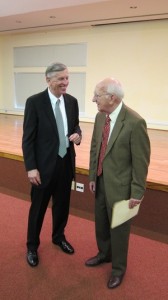
President Tom Ross of the University of North Carolina came to Carolina Meadows under the auspices of the University Speakers Committee earlier this month. His topic was “The Politics of Higher Education,” and he spoke to a full auditorium.
Residents Association President Roy Carroll, himself a veteran of distinguished service to the UNC System, introduced President Ross by pointing out his long and varied career as lawyer, judge, judicial administrator, charitable foundation head, and, in his last previous position, President of Davidson College.
Ross began by saying how much he loved Davidson, but also how strongly he believes in public education and how convinced he is that the University of North Carolina is already among elite public universities and could come to be widely recognized as the best public university system in the world.
He moved immediately to point out the difficulties of obtaining that status in the present economic climate: $2.7 billion in recent “pain,” including $762 million in permanent state budget reductions and another $580 million in reversions (money “sent back” to Raleigh as pressures mount.) The rest of the “pain” comes about from having to extract rising fixed costs from a reduced budget. Bottom line on academic reductions: fewer faculty members teaching more students.
Better news: The past history of careful budgeting and generous state support that has caused pundits to rate UNC as the best bargain in higher education; the multi-billion research industry fueled by a faculty that couples vital teaching with ground-breaking research, funded on a merit assessment by Government agencies, industry partners, charitable foundations; more room than most other state systems to raise tuition and fees (albeit reluctantly); and loyal and generous alumni and other friends.
Ross emphasized the value of UNC to the state: 16 new jobs for every $1,000,000 spent in research; health care and other useful services provided at reasonable cost to citizens in every corner of North Carolina; and the financial stimulus that accompanies an educated citizenry.
The question-and-answer session with President Ross naturally drifted to the agonies of athletic infractions and sequelae. Recognizing the corrective steps that the Chapel Hill campus has already taken, Ross expressed confidence in the return to full integrity in Carolina football. He also viewed with surprise and indignation the slow pace of theNCAA in deciding upon penalties to be assessed. He could not resist the comment that, if he had acted so slowly and delayed his decisions as a judge so outrageously, he should have and would have been fired.
By Paul Hardin
